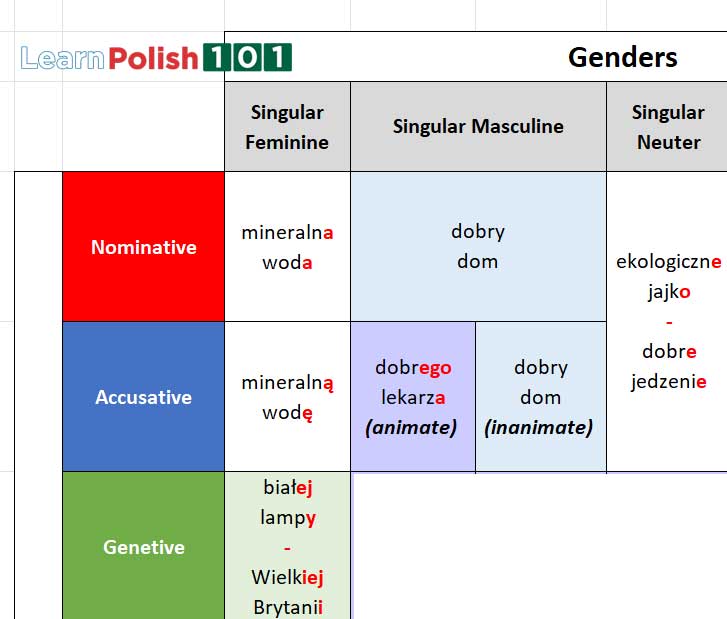Polish Grammar - Genitive Case - Feminine
We've described the Accusitive case as being 'after a verb that is being used positively'. The Genitive case is often described as when 'something is missing or lacking'

In most cases this basically comes down to being after a verb that is being used negatively
For example
- Nie mam (I don't have)
- Nie lubię (I don't like)
- Nie chcę (I don't want)
The mental hook for the Genitive case is to remember it as "Genesis" - the first book of the Christian bible that starts with ... well ... eveything missing!

In the Genitive case we make the following changes if the noun is feminine
- Adjective ending - changes from 'a' to 'ej' - mineralna -> mineralnej
- Noun ending - changes from 'a' to 'y' - woda -> wody)
It is mineral water - To jest mineralna woda
I don't have mineral water - Nie mam mineralnej wody
Listen to the audio several times to get familiar with the change in pronounciation.

Heads up!
The Genetive case will be the hardest part of this course. It may take you a while to crack it. That's normal.
I recommend doing the exercises on this and the next to lessons for several days to practice and let the various endings sink in.
You may want refer to your own notes and tables at first. That's fine. But as you keep repeating the exercises over the next few days you will need them less and less!
Once you crack the Genetive case your Polish will really start to roll!
Continuing to build on the table we started when looking at the Accusative case, here is the Genetive rule for word endings for feminine nouns

See the exercises below for more information on why Wielkiej ends 'iej'.
Adjectives and Cases
The adjectives below are all in feminine form. Sort them into their correct cases.
Drag and drop all the dark blue boxes to their correct locations
Make sure your sound is turned on to hear the audio during this exercise
Think out the Polish
Practice changing the endings of nouns and adjectives to the Accusative case by translating the sentences below.
Make sure your sound is turned on to hear the audio during this exercise
I do not have mineral water | |
I do not have an ecological pizza | |
I do not like natural water | |
I do not like exotic pizza | |
Transfer Nominative nouns to Accusitive
In the following exercise you'll change nominative nouns to the genitive case even though you probably do not know most of the words.
The nominative case of the noun is shown beside the text input box in brackets. Write the full sentence using the Genetive case.
For example, the first sentence is 'I do not have asthma'. The Polish for 'asthma' is 'astma' so the correct answer is 'Nie mam astmy'Make sure your sound is turned on to hear the audio during this exercise
I do not have asthma | (astma)
|
You do not like cotton | (bawełna)
|
I do not want a family | (rodzina)
|
I do not like Canada | (Kanada)
|
You do not like winter | (zima)
|
I do not have a list | (lista)
|
You do not like mustard | (musztarda)
|
I do not have work | (praca)
|
I do not have a toilet | (toaleta)
|
I do not like Aneta | |
Feminine Nouns ending ia, ja or ka
The exception to the 'y' ending rule is feminine nouns ending 'ia', 'ja' or 'ka'. In this case we replace 'a' with 'i'. Try this out in the sentences below
The nominative case of the noun is shown beside the text input box in brackets. Write the full sentence using the Genetive case.
For example, the first sentence is 'I do not like America'. The Polish for 'America' is 'Ameryka' so the correct answer is 'Nie lubię Ameryki'Make sure your sound is turned on to hear the audio during this exercise
I do not like America | (Ameryka)
|
You do not like Astrology | (astrologia)
|
I do not have a daughter | (córka)
|
You do not have democracy | (demokracja)
|
I do not like like Biology | (biologia)
|
I do not want a guarantee | (gwarancja)
|
You do not like history | (historia)
|
I do not have an infection | (infekcja)
|
I do not have islamophobia | (islamofobia)
|
You do not like yoga | (joga)
|
I do not have claustrophobia | (klaustrofobia)
|
I do not want comedy | (komedia)
|
I do not have a conference | (konferencja)
|
You do not have a bathroom | (łazienka)
|
I do not have a ball | (piłka)
|
You do not like politics | (polityka)
|
Transfer Nominative adjectives and nouns to Genetive
In the following exercise you'll change nominative adjectives and nouns to the Genetive case even though you probably do not know most of the words.
The nominative case of the adjective and noun is shown beside the text input box in brackets. Write the full sentence using the Genetive case.
For example, the first sentence is 'I do not like white coffee'. The Polish for 'white coffee' is 'biała kawa' as shown in brackets so the correct answer is 'Nie lubię białej kawy'Make sure your sound is turned on to hear the audio during this exercise
You do not like white coffee | (biała kawa)
|
I do not have a good reputation | (dobra reputacja)
|
I do not want another daughter | (kolejna córka)
|
You do not have a strong democracy | (silna demokracja)
|
I do not have good music | (dobra muzyka)
|
You do not have a large infection | (duża infekcja)
|
I do not like cheap cotton | (tania bawełna)
|
I do not have a large family | (duża rodzina)
|
I do not like this winter | (ta zima)
|
I do not want a new bathroom | (nowa łazienka)
|
You do not have new work | (nowa praca)
|
You do not have an old toilet | (stara toaleta)
|
Transfer Nominative adjectives and nouns to Genetive
With adjectives, after we remove the 'a', if we are left with a 'k' or 'g' as the last letter then we end the adjective 'iej' to make the ending softer and easier to say.
Practice this 'iej' ending by translating the sentences below.
The nominative case of the adjective and noun is shown beside the text input box in brackets. Write the full sentence using the Genetive case.
For example, the first sentence is 'I do not like Great Britain'. The Polish for 'Great Britain' is 'Wielka Brytania' as shown in brackets so the correct answer is 'Nie lubię Wielkiej Brytanii'Make sure your sound is turned on to hear the audio during this exercise
I do not like Great Britain | (Wielka Brytania)
|
You do not want a greek tragedy | (grecka tragedia)
|
I do not like dark chocolate | (gorzka czekolada)
|
You do not have a polish flag | (polska flaga)
|
You do not have thin skin (you are not sensitive) | (cienka skóra)
|
I do not want an expensive bathroom | (droga łazienka)
|
Transfer Accustive nouns back to nominative
In the following exercise you'll see some sentences in both English and Polish. You need to spot the noun and reverse it back into the Nominative case.
For example, the first sentence is 'Mam kartę'. A noun is 'the thing so it is 'kartę'. We need to reverse the 'a' to 'ę' change caused by a noun coming after a verb so the correct answer is 'karta'
Make sure your sound is turned on to hear the audio during this exercise
I do not have a [credit/debit] card | Nie mam karty
|
I do not have [a plot of] land | Nie mam działki
|
I do not like lettuce | Nie lubię sałaty
|
I do not have a cupboard | Nie mam szafki
|
You do not like technology | Nie lubisz technologii
|
I do not like theory | Nie lubisz teorii
|
You do not have a toilet | Nie masz toalety?
|
I do not have a contract | Nie mam umowy
|
I do not like comfort | Nie lubię wygody
|
You do not like soup | Nie lubisz zupy
|
Refresher
Revise earlier words and phrases to keep them fresh! Match the Polish and Engish below
Make sure your sound is turned on to hear the audio during this exercise
Nouns
Tick all of the adjectives which are in feminine Genetive form
Tick all of the boxes you believe are correct
